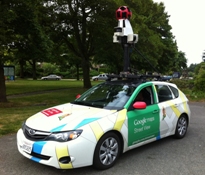Why Google’s Wi-Spy Argument Is Stronger Than It First Appears
 (This is Part 2 of 4 posts on the issue of whether the Wiretap Act bars interception of unencrypted wi-fi signals. See Part I.)
(This is Part 2 of 4 posts on the issue of whether the Wiretap Act bars interception of unencrypted wi-fi signals. See Part I.)
When we last tuned in I was explaining the arguments in the Google “Wi-Spy” case, involving Google’s Street View vehicles’ interception of home wireless network transmissions. Google argues that unencrypted wireless network transmissions are not protected by the Wiretap Act. Forget to set your wi-fi password? Then all of your network communications are free for the taking by your neighbor, local hacker, or multi-national conglomerate driving down the street. Sure, that sounds counter-intuitive, Google might admit, but the Wiretap Act is a counter-intuitive statute (they’ve got that part right, at least).
The plaintiffs argue that Google is simply engaged in lawyer games, willfully contorting the statute in order to save its bacon. There’s a provision in the Wiretap Act that (roughly speaking) defines unencrypted communications to be publicly accessible, but it only applies to radio communications. And, the plaintiffs argue, “radio communications . . . readily accessible to the general public” is only used in one place in the statute, a provision that talks only about “governmental, law enforcement, civil defense, private land mobile, or public safety communications system[s].” Home wireless routers clearly aren’t any of those. The exception that Google needs refers to “electronic communication[s] . . . readily accessible to the general public.” There’s no definition for that use of “readily accessible,” however, so the ordinary English reading will have to suffice.
The district court didn’t take quite the same tack as the plaintiffs.

 Should journalists or security researchers be able to access your home network and change settings without your permission, or snoop on your email and web browsing traffic, in order to further their research? I would think the answer is obviously no, even if the research is legitimate. But two stories that ran last week seem to be expressing dismay at restrictions placed on journalists or security researchers by the
Should journalists or security researchers be able to access your home network and change settings without your permission, or snoop on your email and web browsing traffic, in order to further their research? I would think the answer is obviously no, even if the research is legitimate. But two stories that ran last week seem to be expressing dismay at restrictions placed on journalists or security researchers by the